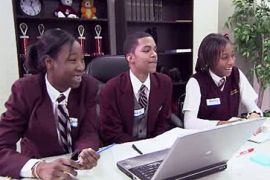
Breaking the stereotypes
Al Jazeera follows two young Americans refusing to let race impede their dreams.
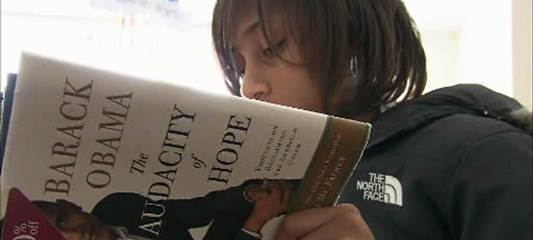 |
| Barack Obama has inspired many young African-Americans like Alisha |
Race is already one of the issues dominating this year’s US presidential election, gaining prominence with the emergence of Barack Obama as a viable candidate for the country’s first black president.
We The People follows two African-American teenagers in Washington DC who refuse to let racial stereotypes be an impediment to their dreams.
In her bedroom in a suburb of the US capital Washington DC, Alisha Talley proudly shows off a series of lists she calls her “wall of dreams”.
“It basically has my hopes for the future,” she says. “This over here is my top 10 colleges, and my someday profession is constitutional lawyer – hopefully a senator later on. Because I think if I become a senator, I can get my voice heard.”
Getting her voice heard is high on the 14-year old’s list when Al Jazeera catches up with her preparing for her school debating team’s forthcoming competition at another local school.
Alisha defies many of the racial stereotypes prevalent in American society.
An African-American teenager she is the vision of what Obama talks about when he refers to “the young people whose attitudes, beliefs and openness to change have already made history in this election”.
| We The People |
|
|
Race is always just beneath the surface of US politics and is an issue that has divided the country since the time of slavery.
Many black students attend schools that are considered inferior to many of the schools attended by their white counterparts.
This makes it harder for young black Americans to compete against white students, and to break out of a legacy of poverty.
Politically involved
Alisha, however, is a member of the debate team at Woodstream Christian Academy, an elite private school in the Washington DC suburbs.
“I’m very involved in politics … I love politics. I watch all the debates and stuff,” she says. “Obama is a very inspirational speaker, I think that he is a perfect example of what your speech should be for any debater.”
Obama’s soaring rhetoric has been a dominating feature of this year’s presidential primary race and the success so far of his campaign has inspired black students such as Alisha to engage in politics in record numbers.
Alisha’s mother, Tiana, says: “Barack Obama is a very good role model. It’s good that he is a black person who gives them the idea that it’s possible, and it makes them dream.”
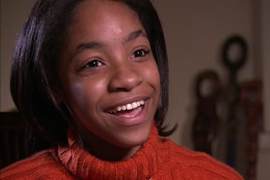 |
| Alexis says racism still exists in the US |
Alisha lives with her mother and stepfather, Mel, in an area where the majority of people are African-American.
As her mother rouses her from bed to attend church, Alisha says: “I’m very proud of my culture. I’m not ashamed of being African-American, but I don’t really like to focus on the race factor.
“Some stereotypes are given to me, whether they are bad or good… And I take them, I run with them, and I get past them, whatever they are.”
Alisha and Candice Brown, her best friend and fellow debater, live in a mainly black area and socialise mainly with other black youngsters. The two of them have opportunities that were rare a generation ago. They do not want to be defined by race.
Candice says: “I don’t really have to face racism because most of the environments I am in are all black,” Candice says. “I go to an all black school, an all black church. I play on an all black basketball team. So I think this is very different from the real world.”
World changers
As he enters the classroom Douglas “Coach” Kump is received with laughs and a “K” salute from his Woodstream students. It is his job to prepare Alisha and Candice for their big debating contest.
“We started the debate programme three years ago with the idea of understanding the world in which we live and wanting to change the world in which we live,” he says.
| In depth |
“That’s really our emphasis here at Woodstream. We want our kids to go out and be world changers.”
Woodstream’s main rivals for the debating crown are McKinley Tech, a prestigious local public school which has collected first place trophies in previous debating competitions and is confident of doing so again.
Alexis Harris is a star of the McKinley team. She has grand ambitions but does have some minor issues with the Democratic party’s two remaining presidential candidates.
“When I first heard about Barack Obama and Hillary Clinton running, I was like, ‘Oh man'”, she says. “Now I’m not going to be able to be the first African-American and the first female president.”
Alexis lives with her three siblings and her father who has raised the four children on his own for 11 years.
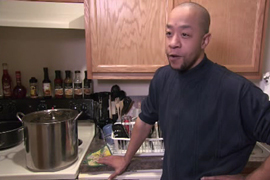 |
| Nolan Harris says he did not have the chances his daughter has |
“When I was in high school, my counsellor, after she looked at my grades, said ‘Son, the best thing that you can do is get a skill because a career isn’t for you,'” Nolan Harris, Alexis’ father says.
“But With Alexis, you talk about opportunities… She has so many more opportunities than I had. I just wonder if she’s going to make it out there, but I know she will.”
Many black families in the US today come under pressure from poverty and unemployment.
Sixty-five per cent of black teenagers are raised by a single parent, while a third of black children live in poverty, and about half of them drop out of high school.
Racial identity
About 40 per cent of homeless people in the US are African-American, while approximately half of the country’s prison population is black.
For those African-American families who have broken the poverty cycle, race and racism continue to affect their lives.
“Even today, racism still exists,” Alexis says. “So if I get on a train, the majority of the people on the train could be Caucasian and probably they’ll think of me as an African-American girl.
“Or you’ll have another side of the train that says, no – she’s just a girl. It’s an American, she’s just a girl.”
The day of the big debate tournament arrives with both schools in bullish mood. The debate is at McKinley Tech – home ground that may give Alexis and her team an advantage.
But Candice and Alisha are also confident.
“The adrenaline’s pumping,” Candice says. “You’re just like, really excited to just debate. All our hard work’s about to pay off. I stayed up all night, it had better be worth something!”
For the Woodstream students the tournament is also a chance to get out of the “bubble” of a private school and mix with children from lower incomes and inner city homes.
Colin Touhey, the director of the DC debate league who is hosting the tournament, says: “People have lower expectations for many of these students because of their skin colour.
“I’ve seen the way that people reacted to the students that we took out on the national circuit. People would ignore them, many of the students felt isolated.
“Race comes up all the time. We’re working on breaking down those barriers. And Woodstream’s a big deal because there are also class barriers that we’re trying to break down.”
Heated debate
The topic of debate revolves around Black History Month – an annual celebration every February of African-Americans who have made a profound difference to US society.
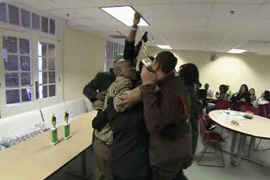 |
| The McKinley Tech team celebrate victory |
Alexis and the McKinley team are to argue in favour of the proposition: that public schools in Washington DC should stop teaching Black History Month, while Alisha and the Woodstream team will argue against it.
Once the topic is announced, the students are given 20 minutes to prepare their arguments.
Given the commitment of the debaters it is no surprise that the debate is heated, with Alexis asking if “one month, the shortest month at that, is enough to cover the struggle, the pain or the agony? We do not think so!”
It is a central argument that sees the McKinley team emerge victorious. But there are only smiles and compliments as the awards are handed out.
“She [Alexis] really set the tone for the debate, and she put the standard there that we have to climb up to,” Alisha says.
Alexis returns the compliment: “I think they did an excellent job. I think it was like the most intriguing and the best debate that I’ve ever been in, really. It was a lot of emotion.
“I used to say that I want to be, like, Venus Williams or Serena Williams, then I got a little bit older and I said, ‘No. I want to be like Oprah Winfrey.’ And then I got older and I was like, ‘No. I want to be like Barack Obama’.
“And then I realised. No. I don’t want to be like any of them. I want to be me. I want to be the first Alexis Harris. That’s what I want to be.”
Watch part one of this episode of We The People
Watch part two of this episode of We The People
We The People, Race airs from Saturday May 31 and can be seen at the following times GMT: Saturday 0130, 1130 and 2330; Sunday 0630 and 1900; Monday 0730.
To contact us click on ‘Send your feedback’ at the top of the page
Watch Al Jazeera English programmes on YouTube
Join our debates on the Your Views page

